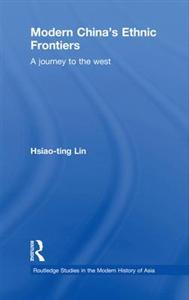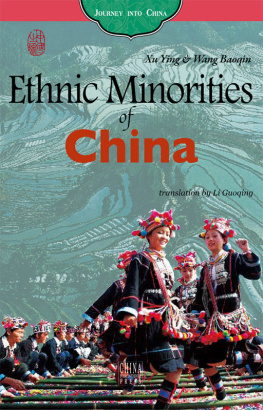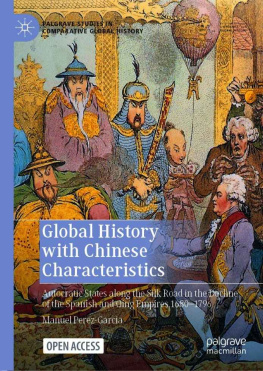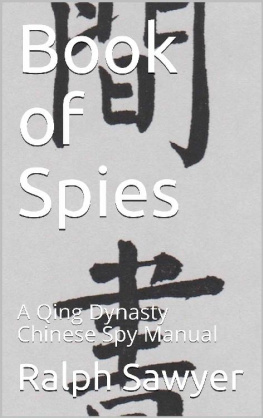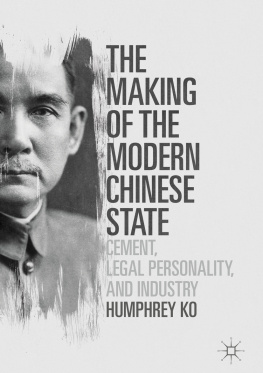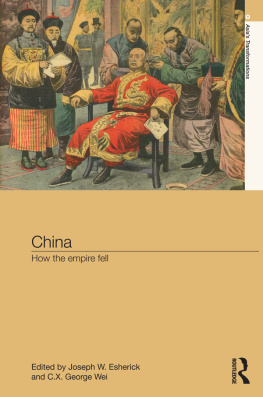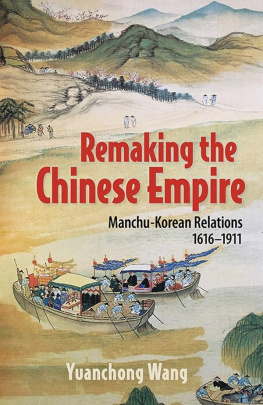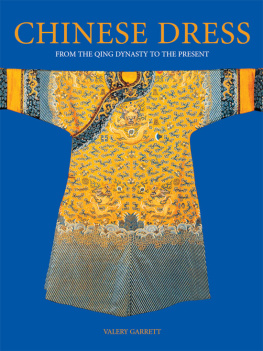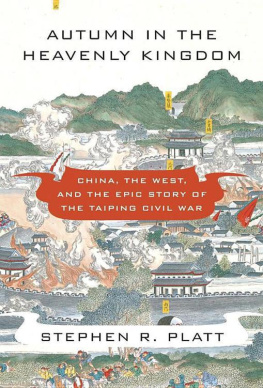Preface
Modern Chinas Ethnic Frontiers: A Journey to the West is meant to be a companion to my earlier book, Tibet and Nationalist Chinas Frontier: Intrigues and Ethnopolitics, 192849. In my first book, I examined Chinas policy toward Tibet during the Nationalist era (192849). I argued that modern Chinas Tibetan frontier was neither the subject of concerted aggression by a centralized and indoctrinated Chinese Nationalist government, nor of an ideologically driven nationalist ethnopolitics. Instead, modern Chinas sovereignty claim over Tibet was much more the result of rhetorical grandstanding by the Nationalists than a definite plan to exert direct control over the region. My first book also delineates how, during the divisive and chaotic Nationalist period, Chinese ethnic territoriality continued to change from a traditional empire to a modern nation-state, often in unexpected and inadvertent ways.
This book further undertakes an important enquiry into the making of modern Chinas frontier territoriality and the nature of Nationalist ethnic frontiers from a fresh and broader perspective. It was stimulated, to a large extent, by a reviewer of Tibet and Nationalist Chinas Frontier who remarked that I should further stretch the focus from Tibet to modern Chinas other Inner Asian ethnic borderlands that were inherited from the Qing imperial house and the Peking-based Republican government by the originally localized, power-restrained Chinese Nationalist regime. In conclusion, this review article strongly suggested I re-examine the nature of the Nationalist frontier and ethnic politics as well as its impact on the formation of post-1949 contemporary Chinas border security and ethnic territoriality.
To a considerable degree, this new research is also stimulated by a series of political unrests in Chinas ethnic frontiers in recent years. One still remembers the ethnic minorities anti-government riots in Lhasa and Khotan before the 2008 Beijing Olympic Games, the abortive attempt by the Muslim Uighurs to crash a domestic airplane flying between Urumqi and Beijing around the same time, and the UighurHan ethnic confrontations in Urumqi and other oasis cities in Xinjiang in 2009. These incidents strongly indicate that governing Chinas far-flung ethnic borderlands has been, and will continue to be, a haunting challenge to the leaders of the Peoples Republic of China. Modern Chinas Ethnic Frontiers is therefore both an extension to my previous book and a response to a timely and important research topic which has been, and continues to be, one of present-day Chinas most pressing issues.
There has been an explosion of history-writing in the recent decade. Volumes exploring modern Chinese ethnic frontiers and minority histories of varying geographical scope and subject matters are to be found on the shelves of bookshops everywhere, together with histories of every other time and place. With little doubt, the issues relating to Chinas complicated ethnicity and ethnopolitics, from the Qing imperial period to the early Peoples Republic, have become a trendy focus in recent scholarships. Among recent literature, some are intended for an academic audience, some cover only limited periods of time and space, some focus on particular non-Han ethnic characters, and still some are based entirely on Western or secondary Chinese sources. In this book my purpose has been to try to provide for both specialists and general readers, a concise, overall picture of modern Chinas frontier and ethnic politics from the late Qing of the 1900s to the Peoples Republic in the early 1950s, during which period the Han-Chinese Nationalists were the main players of post-imperial Chinas politics. My aim has been to counter the over-simplified and stereotyped notion that, when it comes to ethnic territorial disposition, the Nationalists and their regime, indoctrinated under the leadership of Sun Yat-sen and Chiang Kai-shek, were revolutionary and ideologically oriented, and had perennially resorted to nationalism to restore post-Qing Chinas sovereignty over frontier territories and ethnic peoples.
I would say that it is not the intention of this book to focus on a specific incident or event as a case study to demonstrate how the Nationalists dealt with Chinas ethnic-frontier issues according to the aforementioned assumption. Rather, I try to illuminate what best characterizes modern Chinas ethnic frontiers and politics. By providing a broad and clear view of how modern Chinas ethnic frontiers and orders has slowly evolved, this research elucidates the main factors leading to the Nationalist presence in the defunct Qing Empires territorial reaches in western frontiers, where the post-1949 Chinese Communists substantiated their authority within a relatively short span of time. To a large extent, this process of Nationalist power stretch into non-Han ethnic peripheries was closely related to how the modern Chinese state was defined or re-defined, and how post-imperial Chinese ethnic frontier politics was exploited by the Nationalists as a way to fulfill their goals of state-building and regime consolidation.
This book is perhaps one of the very first English-language studies to provide a comprehensive survey of the development and evolution of Chinese Nationalist frontier and ethnopolitical practice. I hope it will fill an important lacuna in the historical scholarship on modern China which has tended to focus on the frontier ethnopolitics of the Qing Empire and the Chinese Communists while missing the important bridging role played by the Chinese Nationalists and their regime.
This research has benefited substantially from the release of new modern Chinese source materials in recent years. With the availability of Nationalist Chinese official documents, private papers and diaries of top Nationalist leaders like Chiang Kai-shek and T.V. Soong, a reassessment of modern Chinas history has not only become a possibility, but also a necessity. Having access to these new materials not only helps us obtain a more balanced perception toward the Nationalists and the Chinese politics of their time, but also allows us to realize how these leaders conceptualized a China which they endeavored to administer. Without a doubt, one important, thorny, and yet unavoidable agenda confronting these Nationalist leaders was post-imperial Chinas ethnic frontier and minority issues, and Chinas transformation from a multi-ethnic empire to a nation-state that had brought about these issues.
In short, this book scrutinizes practices and policy-choices of Nationalist Chinas frontier territorial agenda. Readers may discover that I have sought to de-construct and de-ideologize the Nationalists strategies to substantiate their authority in peripheral China, and tried to demonstrate that the making of modern Chinas central authority in the Inner Asian frontiers was closely related to the external and domestic factors that had threatened the security and survival of the originally localized Nationalist regime. Seeing this historical phenomenon as a display of opportunistic nationalism or pragmatic nationalism on Chinas ethnic frontiers, I argue that this power-furtherance process in Chinas traditional peripheries was more the result of political reluctance, incidentals, and inevitability on the part of the Nationalists than the deliberately orchestrated ethnopolitics predominated by their revolutionary ideologies. The rationale behind this process, as I will show in this book, was mainly regime survival and security. The exploration of this topic, I hope, will offer a sweeping reappraisal of modern Chinese nationalism in the context of the central regimes opportunistic and pragmatic practices to cope with complex and delicate ethnic territorial issues. It is also my wish that readers will find this work exciting, discovering that what emerges from it is a new understanding of the Nationalists flexibility and strategic policy toward Chinas far-flung ethnic frontiers.

